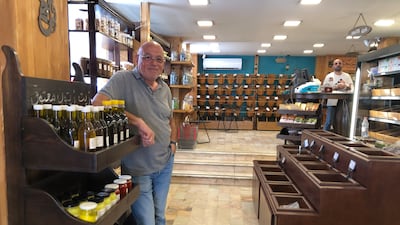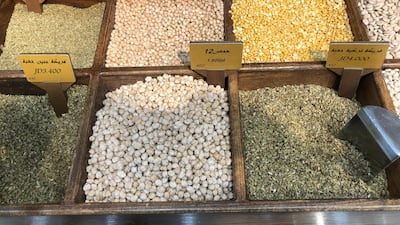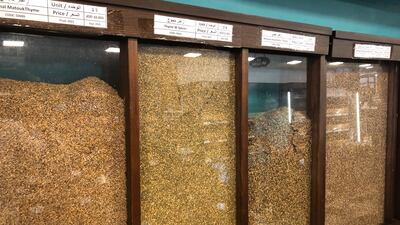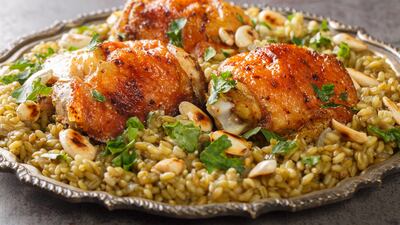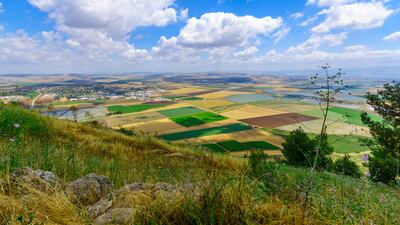Farmers have been cultivating wheat for centuries in the historic Jezreel valley, near the Palestinian Jenin refugee camp that was the target of a major Israeli offensive last week.
The attack in the occupied West Bank killed 12 Palestinians and destroyed large parts of the camp, drawing messages of sympathy and support from Jordan and other Arab countries.
Despite a century of upheaval, including the latest bout of violence, two food staples – freekeh and zaatar – continue to make their way from the Palestinian territories, particularly Jenin, to Jordan.
It is rare to find a kitchen cupboard in Amman's middle class homes that does not have freekeh, a roasted green wheat used as an alternative to rice, from Jenin.
Jordan’s society and politics are intertwined with Palestine, with economic and family links predating the kingdom's founding as a British protectorate in 1921.
Enduring links remain with areas that ancestors of many Jordanians fled from, when Israel was founded in 1948.
The roasting of freekeh is done following an old method of setting fire to the freshly harvested crop while it's in the fields.
“We only have Jenin freekeh. It's the best,” says Ahmad, one of the brothers operating Matouk, a renowned family spice business in the Sweifieh commercial quarter of Amman.
He says the Jenin variety, at $4.50 per kilo, is considered superior to Egyptian freekeh, which sells in supermarkets for about $1.50 per kilo, or 66 per cent less.
“It also does not have stones,” he says.
Luckily for spice suppliers, the freekeh season in Jenin was in April, before the Israeli offensive could have disrupted supply.
Stocks in Jordan from Jenin will last until next season, says the manager at another spice shop, adding that freekeh can be stored two years.
“We are OK for now but anything is possible next year,” he says.
When cooking, freekeh can be lightly fried in a pan, before water that has been prepared with chicken broth and spices is slowly added to it. The pan is covered afterwards with a cloth for moisture to set in. The process has to be performed gradually, to avoid the freekeh becoming 'mukhabsah', or putty.
In its purist form, freekeh is eaten alone or on the side of qallayet bandora – a simple mix of pan fried tomatoes, onions, garlic and hot green peppers, garnished with salt and pepper.
It also goes well with chicken.
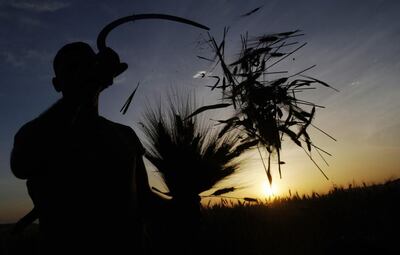
Mansaf, a traditional meal in Jordan and Syria made with jameed (dry cheese sauce) is often made with freekeh and chicken, instead of rice and mutton.
At Khaldoun Kabatilo, a nearby spice shop, Jenin freekeh is sold next to Turkish freekeh, which is more expensive.
“Buy the Jenin one,” a staff member tells a customer. “It is even roasted better. You can tell from the colour.”
Another staple coveted for being sourced from Jenin is zaatar, a mixture of crushed dried thyme and condiments. The thyme is imported from the Palestinian farmers before traders in Jordan and elsewhere add their own recipes to it.
The more condiments added to it, such as dried chickpeas and sesame, the less expensive the zaatar is. The high-end mix, which sells for $13 to $16 a kilo, only consists of thyme and a dash of sumac, a red spice that is tangy and sweet.
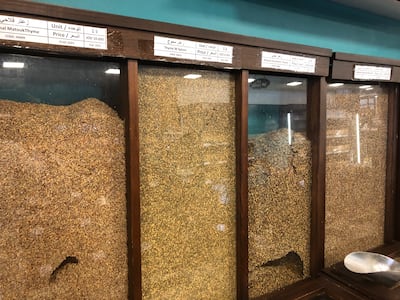
Zaatar is eaten with bread and olive oil, which Jenin is also famous for.
But relatively few people in Jordan know how it tastes, because of restrictions to protect domestic olive production. Sometimes, though, Jenin residents send their relatives some of the oil in bottles across the Allenby Bridge, which links Jordan with the West Bank.
The latest official data shows that Palestinian exports to Jordan were $66 million in 2021, a 31 increase compared with the year before.
Jordanian exports to Palestine increased 23 per cent to $185 million in the same period.
Firas Herbawi, one of the largest importers of Jenin zaatar in Jordan, says that it comes from the highlands and the supply has not been affected by the violence.
“There will be always Jenin zaatar,” he says.
